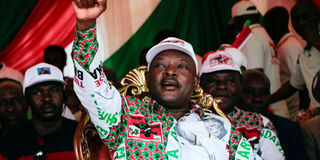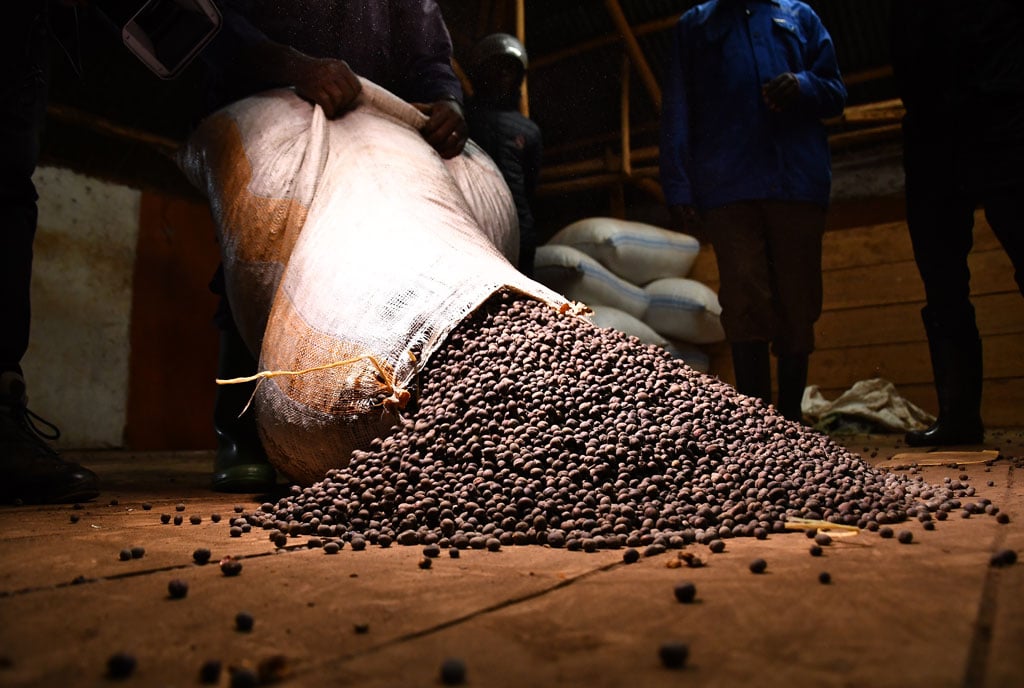Prime
Burundi: Poor country wracked by ethnic conflict

In this file photo taken on May 16, 2020 Burundi’s incumbent president Pierre Nkurunziza raises his fist as he reacts to supporters during the last campaign rally of the candidate of the ruling party the National Council for the Defense of Democracy - Forces for the Defense of Democracy (CNDD-FDD), in Bujumbura, ahead of Burundi's presidential and general elections scheduled for May 20, 2020, despite the COVID-19 (novel coronavirus) pandemic. AFP PHOTO
What you need to know:
- Burundi has been mired in political crisis since 2015, when former Hutu rebel chief Nkurunziza, in power since 2005, announced he would run for a third term.
- Landlocked and situated in Africa's Great Lakes region, Burundi is one of the continent's smallest nations at 27,834 square kilometres (10,747 square miles), and one of its most densely populated
The small central African country of Burundi, whose outgoing president
, is one of the poorest in the world, with a history of political crises, ethnic massacres and a long civil war.
Nkurunziza's successor Evariste Ndayishimiye won presidential elections on May 20, and is set to be sworn in in August.
Key facts:
Third poorest in world
Landlocked and situated in Africa's Great Lakes region, Burundi is one of the continent's smallest nations at 27,834 square kilometres (10,747 square miles), and one of its most densely populated.
Green and fertile, it is nevertheless one of the three poorest countries in the world, with 75 percent of its population living below the poverty line, according to the World Bank.
The UN's Food and Agriculture Organization estimates 1.7 million of Burundi's 11 million people are experiencing chronic severe food insecurity.
Very mountainous, it often suffers from landslides.
Farming forms the backbone of the economy, with coffee and tea employing 80 percent of the population and accounting for 40 percent of gross domestic product.
Burundi has rare-earth minerals essential to technological and military products.
The political capital is Gitega and the economic capital Bujumbura.
READ:
Massacres, coups, war
Ethnic Hutus make up 85 percent of the population and Tutsis 14 percent.
Tensions between Hutus and Tutsis have boiled over repeatedly since independence from former colonial power Belgium in 1962.
In 1972, a failed Hutu-led uprising against the Tutsi-dominated leadership sparked a wave of massacres of Hutus that left, according to various estimates, between 100,000 and 300,000 dead.
In 1976, a military coup brought Jean-Baptiste Bagaza to power. In 1987, he was overthrown and Pierre Buyoya, another Tutsi military officer, became head of state.
In 1988, new massacres of Hutu left between 5,000, according to an official toll, and 50,000 dead.
The assassination in 1993 of first Hutu president, Melchior Ndadaye, in a coup fomented by Tutsi soldiers triggered a civil war between the Tutsi-dominated army and Hutu rebels. Thousands of Tutsi were massacred after the assassination.
The civil war lasted until 2006 despite several peace deals, notably one signed in Tanzania in 2000, several years before the two main rebel groups laid down arms.
The war left nearly 300,000 dead, mainly civilians, and ruined the economy.
Political crisis
Burundi has been mired in political crisis since 2015, when former Hutu rebel chief Nkurunziza, in power since 2005, announced he would run for a third term.
The opposition said this would violate the constitution and jeopardise deals ending the civil war.
A clampdown on demonstrations and Nkurunziza's re-election that year failed to stem violence, and massive rights abuses intensified.
Around 1,200 were killed and more than 400,000 fled the country up to May 2017, according to the International Criminal Court (ICC), which has launched an investigation into suspected crimes against humanity.
In 2018 Nkurunziza surprised observers by announcing he would not stand in the forthcoming election.
Ndayishimiye was on June 4 declared victor of the May 20 2020 presidential elections, after the country's top court dismissed an opposition bid to have the result overturned.
Celebrated novel
The novel "Small Country" by Franco-Rwandan novelist and rapper Gael Faye, about a boy in Bujumbura whose carefree life is devastated by the civil war, has received several literary prizes and been translated into nearly 40 languages.
The release of a film version has been delayed by the coronavirus epidemic.




